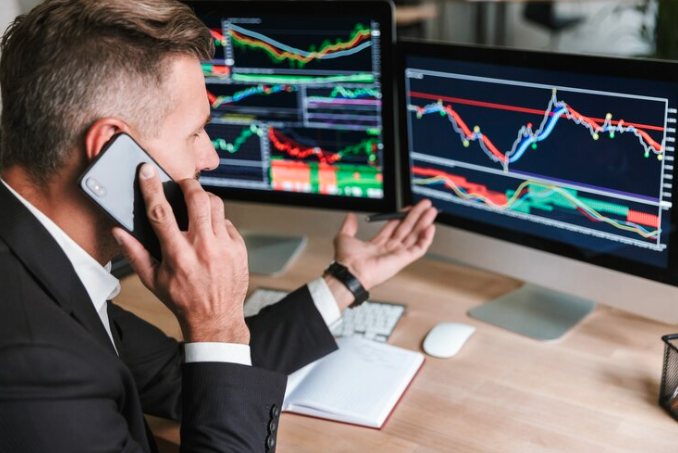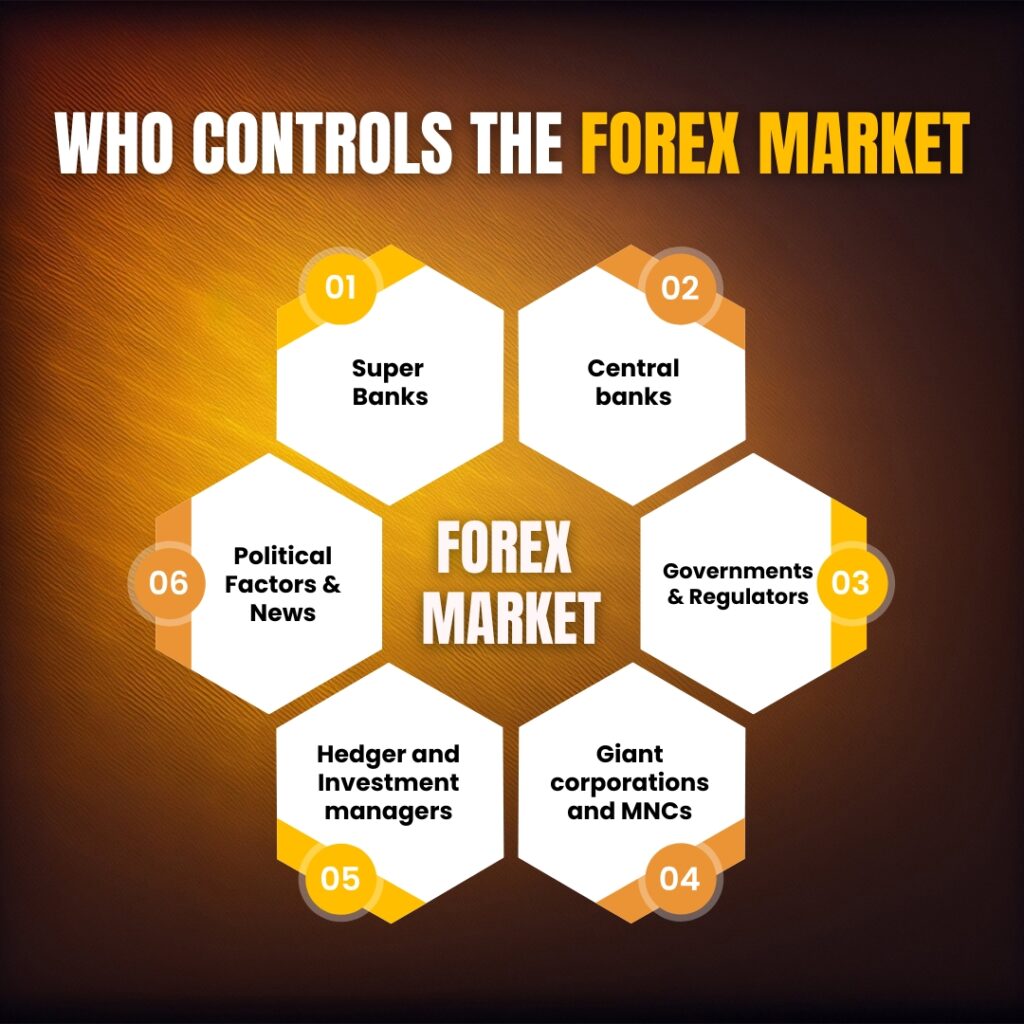Who Controls the Forex Market & It's Major Participants
The Forex Market is a dynamic and ever-changing over-the-counter market. It is open 24 hours and 5 days a week. Trillions of dollars are traded in the Forex Market daily. From commercial banks to retailer traders, there are several participants in the forex market. Now the question arises, Who controls the forex market and its participants? It is important to first understand the forex market and its participants in order to understand who controls it.
What is Forex Market?
It is the world’s largest financial market, with major participants including big banks, corporations, institutions, and individuals who participate in the buying and selling of currencies for different reasons.
The players in foreign exchange market use hedging strategies against currency and interest rate fluctuation for diversifying their investments on the basis of geopolitical events.
Here's a quick look at what you'll read
The Forex Market is the world’s largest financial market where buying and selling of currencies take place for different reasons.
There are many ways an individual trader can trade in Forex, which includes spot markets, forwards, currency futures, swaps, and options contracts.
There are four major sessions in the forex market, which include London, New York, Sydney, and Tokyo. However, the forex market is dominated by three forex sessions which include London, New York, and Tokyo.
Large Commercial Banks, Central Banks, MNCs, Retail Traders, Brokers, and Hedgers are the major players in the Forex Market.
There is no single entity or organization that controls the forex market. However, in most countries, Central Banks control, monitor and supervise the trading activities of Forex in most of the country.
Super Banks are the largest commercial banks that determine the Exchange rates based on the supply and demand of a particular currency. For example, Deutsche Bank, UBS, Citigroup, etc.
Forex trading is controlled by macroeconomic, political, environmental, technical, and social factors.
All the Forex players have an impact on the forex market. These players can influence the market. However, none of them directly control the forex market entirely.
How to trade in Forex?
There are different types of FX markets in which one can trade-in. It includes spot markets, forwards, currency futures, swaps, and options contracts.
Who dominates the forex market?
There are four major sessions in the forex market, which include London, New York, Sydney, and Tokyo.

However, the forex market is dominated by three forex sessions which include London, New York, and Tokyo.
There are more than 170 legal currencies in the forex market. However, USA Dollars and the other seven major currencies control the forex market. Traders usually trade in major currency pairs as it is easy to keep an eye on these pairs rather than all of the currency pairs.
Participants in Forex Exchange Market
The Forex Market is made up of some major players such as Big commercial banks, central banks, Multinational Corporations, and hedge funds, and some minor players like traders, speculators, scalpers, brokers, etc. Have a look at the list of these participants.
- Large Commercial Banks
- Central Banks
- Government and Regulators
- MNCs
- Exchange Traded Funds
- Small and Medium Banks
- Forex Trading Platforms
- Retail Traders
- Brokers
- Hedgers
The FX market is a type of decentralized market which means that there is no single organization that regulates the activities related to currency trading. Now a question arises if there is no central entity in Forex trading, then who controls the Forex Market?
The answer is there is no single entity or organization that controls the forex market. However, the major participants of the Forex Market, such as commercial banks, central banks, and big companies, act as market makers and dominate the forex trading.
Let us study the major participants of the forex market separately who control the forex market directly or indirectly and how they do so with the respective examples.

Super Banks
There are some large commercial banks globally that act as market makers in the forex market, and that’s why these banks are also regarded as Super Banks, as they directly influence the trading market.
Exchange rates are determined by these largest commercial banks based on the supply and demand of the particular currency. The bid/ask spread is usually determined by these market managers.
These Big Banks, collectively called the interbank market, indulged in large numbers of forex transactions on a daily basis. Here are some examples of these Super Banks.
- Deutsche Bank
- UBS
- Citigroup
- HSBC
- JPMorgan
- Barclays
- Goldman Sachs
- Bank of America
Central banks
The central banks are the institution that manages the currency and all financial activities of the country. The right to print and distribute the currency is reserved to the central bank of a country.
Central Banks are amongst the most prominent players in the forex market. They control, monitor, and supervise the trading activities of Forex in most of the country.
Central banks have certain significant powers related to trading. Due to this, they influence the Forex Market. A central bank intervenes in the market when its currency becomes a problem for the domestic economy.
Let us understand how the Central Bank influences or controls the forex market with an example. USD/HKD is allowed to trade within a range of 7.75 to 7.85. If the USD/HKD exchange rate gets too close to the upper range, the Hong Kong Monetary Authority (HKMA) will sell it, while if it gets too close to the lower range, it will buy it.
Governments and Regulators
Governments of every nation influence the forex market. They are also among the major participants of foreign exchange as they also take advantage of foreign exchange inflation to boost their economy.
Government can influence or control the foreign exchange market by making different rules and regulations related to forex trading in a particular country.
Let us understand how a government of a country influences the forex market. For example, suppose the government of the USA introduces policies that promote economic growth; as a result, the value of the US Dollar will appreciate.
Giant corporations and MNCs
Central Banks, Commercial Banks directly control the prices. However, there are some MNCs and Big Giants that indirectly influence the forex market.
These big companies trade in large volumes as they are engaged in the import and export of goods and services. For this purpose, they exchange currencies in large amounts, which influences the market.
Let us understand it with an example; an economic report states that there are various new MNCs established in India, and In China, various MNCs stopped working due to regulation. As a result, the value of the Rupee appreciates against the Chinese Yuan.
Suppose the raw material of the Apple company came from China. For buying these raw materials, Apple exchanges currencies on a daily basis to buy the raw material from China. It has a positive impact on China’s currency.
Hedger and Investment managers:
Hedging is the process of protecting the position from the risk of losses. After the central banks and large commercial companies, the hedger funds are the second-biggest players in the forex market.
These managers are indulged in currency trading for accounts such as pension funds and endowments. Investment managers also participate in forex trading to buy and sell commodities. These also contribute to a price change in the forex market indirectly.
Factors that control forex trading
Besides these participants, there are some factors that act as market makers in the forex market and control the trading. It has been found that forex trading is also controlled by some macroeconomic factors, political, environmental, social, and technical analys factors. Let us have a look at these factors.
Interest Rates:
The change in the interest rate of a particular country also affects forex trading. If the interest rate of a country sees an increase, then it means that the economy of the country is growing and vice versa.
Suppose the Bank of America determines a low-interest rate. It means the country is facing tough times. As a result, it had a negative impact on US Dollars.
Political Factors and News:
News plays a very important role in forex trading. Not only this but predictions or speculations are also made due to the possibility of a news event.
Suppose there is covid outbreak in the UK. The country is facing hard times in dealing with it. As a result, the value of the Euro saw a negative impact.
The change in political factors of a country also influences forex Trading. If a country has a stable political environment then the demand for the currency increases and if not then its demand decreases.
For Example, There is Political Turmoil in the USA. The natives are protesting against the existing government in large numbers as a result the value of the Dollar is depreciated.
Economic Reports:
The value of a currency directly controls the economic status of a country. The Gross domestic product, National Income, Per capita income, poverty line, literacy rate, and other reports have a direct impact on a country’s economy.
Let us understand with an example, Suppose the inflation rate rose in Zimbabwe. So it is not the right time to invest in Zimbabwean Dollars.
Capital Markets:
Industries, MNCs, corporations, institutions, and other organizations also play an important role in determining a country’s wealth. Some countries depend on the commodities sector, some on the industrial sector, and some on a particular raw material. Due to changes in these sectors, the future of the country also changes.
Suppose the Canadian Dollar’s value is greatly affected by commodities, such as crude oil and metals. Due to some factors, the demand for crude oil increases. As a result, it had a positive impact on Canadian Dollars.
Conclusion
The Forex Market is made up of Big Banks, companies, retailers, brokers, and corporations. There is no single entity that controls the forex market. However, there are some major market makers and factors that control and influence trading in Forex.
The central banks, investment giants, and small traders participate to generate profits from currency fluctuations in Foreign Exchange. For a small trader, it is a very complex task to study trends, learn about all market makers and develop trading strategies on the basis of it.
All the players have an impact on the forex market. These players can influence the market. However, none of them directly control the forex market entirely. Therefore even a small trader, by analyzing the market situation efficiently, can make money in the market.
